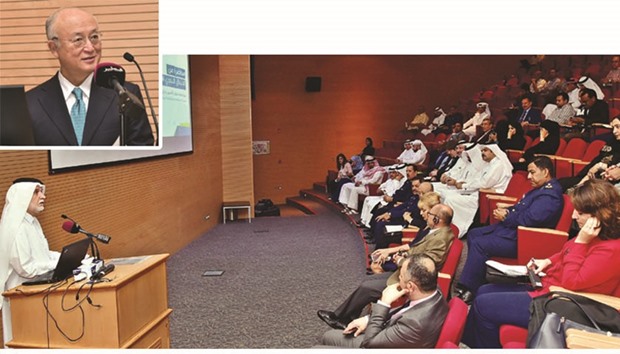The International Atomic Energy Agency (IAEA) seeks to accelerate and enlarge the contribution of atomic energy to peace, health and prosperity throughout the world, and not to further any military purpose, director-general Yukiya Amano told a gathering at Qatar University (QU) recently.
He was delivering a lecture on the Iran nuclear deal at QU’s Research Complex Auditorium. Organised in conjunction with the National Committee for the Prohibition of Weapons (NCPW), the lecture focused on four key areas: the Iranian nuclear programme, main points of the deal, points of concern and impact of the deal on the region.
Amano gave an overview of IAEA’s role and strategy, and outlined details of the agency’s nuclear technology and applications. He noted that IAEA was strongly linked to nuclear technology and its controversial applications, either as a weapon or as a practical and useful tool.
He highlighted IAEA’s ongoing efforts since 2003 to ensure that Iran was committed to fulfilling its obligations as an NPT (non-proliferation treaty) state party.
Amano recalled that a movement started in 2013 was concluded by the P5+1 nuclear agreement with Iran. The agreement assures the peaceful nature of the Iran nuclear programme. Last year, the IAEA signed a roadmap with Iran to draw the Iranian nuclear dimensions.
He also stressed the importance of “nuclear medicine technologies” – a cutting-edge-technology to solve various contemporary issues related to medicine, agriculture and climate by using nuclear technology. “Nuclear techniques play a pivotal role in addressing needs related to the prevention, diagnosis and treatment of health conditions, in particular non-communicable diseases such as cancer and cardiovascular diseases.
“They can also help monitor and address malnutrition in all its forms, from undernutrition to obesity. Many countries have started to use nuclear medicine technology to cure cancer and other fatal diseases.”
QU’s chief strategy and development officer Dr Darwish al-Emadi said the event comes as a result of a memorandum of understanding signed in 2015 between QU and NCPW to increase students’ awareness on issues relating to international conventions on the prohibition of weapons of mass destruction through organising training sessions and awareness workshops on relevant key issues.
Also present on the occasion were QU vice president for academic affairs Dr Mazen Hasna, NCPW chairman Major General Staff (Pilot) Nasser Mohamed al-Ali, deputy chairman Brigadier (Air) Hassan Saleh al-Nesf, members of the committee and representative of Hamad Medical Corporation, other QU officials, faculty members, staff and more than 200 students from across QU colleges.

Dr Darwish al-Emadi addressing the gathering. Top left photo: Yukiya Amano.
